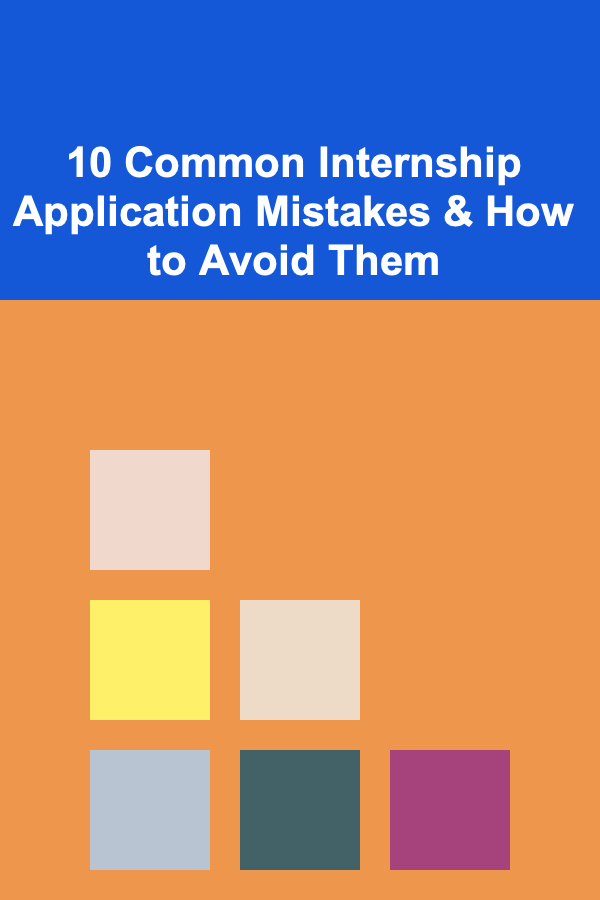
10 Common Internship Application Mistakes & How to Avoid Them
ebook include PDF & Audio bundle (Micro Guide)
$12.99$7.99
Limited Time Offer! Order within the next:

Internships are essential stepping stones toward launching a successful career. They provide valuable hands-on experience, networking opportunities, and insight into potential career paths. However, many applicants make avoidable mistakes during the internship application process that can hurt their chances of landing an opportunity. Understanding these common mistakes and learning how to avoid them is crucial to enhancing your application and making a strong impression.
In this article, we will explore ten common internship application mistakes, why they occur, and how to avoid them. By being mindful of these pitfalls, you can boost your chances of securing your ideal internship position.
Failing to Tailor Your Resume and Cover Letter
Mistake:
One of the most common mistakes applicants make is submitting a generic resume and cover letter to multiple internship positions without customizing them for the specific role and company.
Why It Happens:
Many candidates take shortcuts by sending the same documents to every employer in hopes of maximizing their chances. However, this approach often leads to a lack of connection between the applicant and the job.
How to Avoid It:
Tailor your resume and cover letter for each application. Highlight relevant skills, experiences, and qualifications that align with the internship's responsibilities and the company's goals. Customize your cover letter by showing knowledge about the company's culture and what excites you about the role.
Checklist:
- Adjust your objective statement to match the company's mission and job requirements.
- Emphasize the skills and experiences that align with the role.
- Use keywords from the job description to demonstrate your fit for the role.
Submitting an Unprofessional Resume or Cover Letter
Mistake:
Sending out resumes or cover letters that are unpolished, disorganized, or full of errors can immediately disqualify you from consideration.
Why It Happens:
Applicants may rush through the process, failing to proofread their materials or make them look professional.
How to Avoid It:
Before submitting any application, double-check your resume and cover letter for formatting issues, grammar errors, and typos. Consider using professional resume templates and investing time in crafting an engaging, well-written cover letter. Tools like Grammarly or even asking a mentor or peer to review your documents can make a big difference.
Checklist:
- Ensure correct formatting (consistent font size, margins, and spacing).
- Check for spelling and grammatical errors.
- Use a professional tone throughout the application materials.
- Avoid using an unprofessional email address (e.g., "[email protected]").
Ignoring the Application Instructions
Mistake:
Many candidates fail to read or follow the application instructions properly, such as missing a required document or submitting materials in an incorrect format.
Why It Happens:
Applicants are eager to apply and may overlook key instructions or take shortcuts to save time.
How to Avoid It:
Carefully read the application instructions before submitting. Make sure you follow all directions, including document format, submission method, and required attachments. If the employer asks for a specific file type (PDF, Word document, etc.), make sure to follow their request.
Checklist:
- Thoroughly read the job posting to identify any application instructions.
- Double-check that you've included all required documents (resume, cover letter, portfolio, etc.).
- Follow submission guidelines, such as file type and naming conventions.
Neglecting to Research the Company
Mistake:
Applying for an internship without understanding the company's values, culture, or products can make your application seem disengaged and lack enthusiasm.
Why It Happens:
Sometimes, applicants apply to as many internships as possible without dedicating time to research each company thoroughly.
How to Avoid It:
Take the time to research each company before applying. Visit their website, read up on their mission statement, review their products or services, and try to learn about their corporate culture. You can even check their social media pages to get a better sense of the company's environment. Mention specifics in your cover letter that show your knowledge of the company and your genuine interest.
Checklist:
- Visit the company's official website and social media pages.
- Mention a recent company project or initiative in your cover letter.
- Tailor your responses to show alignment with the company's values and culture.
Not Following Up After Application Submission
Mistake:
Failing to follow up after submitting your application can cause your materials to get lost in a sea of applicants, especially for highly competitive internships.
Why It Happens:
Applicants assume that once they submit their application, the ball is entirely in the employer's court. They may not know when or how to follow up.
How to Avoid It:
Following up shows initiative and enthusiasm for the position. Send a polite email to the hiring manager or recruiter within a week or two of submitting your application. Thank them for considering your application and inquire about the timeline for the hiring process.
Checklist:
- Wait at least one week after submitting your application before following up.
- Send a polite, concise follow-up email to the hiring manager.
- Restate your interest in the position and express your gratitude for the opportunity.
Not Showcasing Relevant Skills or Experience
Mistake:
Applicants often neglect to highlight the skills and experiences that are most relevant to the internship they're applying for.
Why It Happens:
Some candidates may feel that their experiences or skills aren't impressive enough, leading them to downplay relevant qualifications.
How to Avoid It:
Ensure that your resume and cover letter showcase the skills, experiences, and coursework that are directly applicable to the role. If you lack specific work experience, highlight transferable skills such as communication, leadership, or teamwork. Use concrete examples and achievements to demonstrate your capabilities.
Checklist:
- Use bullet points to list your relevant experiences and skills.
- Focus on your achievements and the impact of your contributions.
- If you lack experience, emphasize your academic achievements, volunteering, or relevant extracurriculars.
Sending an Unclear or Overcomplicated Resume
Mistake:
Some applicants make their resumes too complicated by including excessive details or information that doesn't relate to the role.
Why It Happens:
Applicants may try to showcase every skill or piece of experience they have, but this can clutter the resume and distract from key qualifications.
How to Avoid It:
Keep your resume concise and focused. Limit it to one page (for internships, especially) and use bullet points to present your experience clearly. Highlight only the most relevant experiences and skills that align with the job description. Avoid including personal hobbies or irrelevant job experiences unless they directly contribute to your candidacy.
Checklist:
- Limit your resume to one page.
- Use bullet points to make the content scannable.
- Remove irrelevant information that doesn't contribute to the application.
Not Demonstrating a Strong Work Ethic
Mistake:
Some applicants fail to show that they are motivated, hardworking, and committed to the internship experience.
Why It Happens:
Candidates may assume that their academic credentials or previous experience will speak for themselves without demonstrating a clear work ethic.
How to Avoid It:
Use your resume, cover letter, and interview responses to emphasize your work ethic. Discuss your time management skills, your ability to meet deadlines, and examples of times when you went above and beyond in previous work or academic settings. Show how you will bring that same drive and dedication to the internship role.
Checklist:
- Discuss specific examples where you showed initiative or commitment.
- Mention any relevant projects or responsibilities that demonstrate your work ethic.
- Use action verbs (e.g., "led," "managed," "completed") to describe your achievements.
Overlooking Networking Opportunities
Mistake:
Failing to take advantage of networking opportunities can limit your chances of finding an internship and getting hired.
Why It Happens:
Some applicants may underestimate the power of networking, assuming that a strong resume and application will be enough.
How to Avoid It:
Reach out to professionals in the industry, attend career fairs, and participate in networking events. LinkedIn can also be a powerful tool for connecting with alumni or employees of companies you're interested in. A referral or strong connection can significantly improve your chances of landing an interview.
Checklist:
- Attend networking events, such as career fairs or industry conferences.
- Utilize LinkedIn to connect with professionals and alumni.
- Reach out to individuals within your network who may have internship leads or advice.
Waiting Too Long to Apply
Mistake:
Many students wait too long to apply for internships, missing deadlines or applying too late to secure competitive positions.
Why It Happens:
Applicants may procrastinate because they feel they have time or because they're unsure of the application process.
How to Avoid It:
Start researching and applying for internships as early as possible. Many internship programs have deadlines several months in advance, and early applicants are often considered first. Set a timeline for yourself to stay on track and apply well before the deadline.
Checklist:
- Research deadlines early and make a schedule to apply in advance.
- Set reminders for application due dates.
- Apply as soon as possible to increase your chances of being considered.
Conclusion
Applying for internships can be competitive and intimidating, but avoiding common application mistakes can significantly improve your chances of success. By tailoring your materials, following instructions carefully, and demonstrating your skills and work ethic, you'll present yourself as a strong candidate.
With the right preparation, attention to detail, and persistence, you can increase your chances of landing your dream internship and setting yourself up for success in your career. Stay focused, stay organized, and avoid these common mistakes, and you'll be well on your way to securing an internship that can launch your professional journey.
Reading More From Our Other Websites
- [Home Storage Solution 101] How to Store Holiday Decorations Efficiently and Compactly
- [Home Party Planning 101] How to Set Up a Party Space That Encourages Conversation
- [Personal Care Tips 101] How to Make Your Skin Feel Clean and Refreshing with Toner
- [Paragliding Tip 101] Understanding Local Laws: What Every Paragliding Pilot Must Know Before Takeoff
- [Hiking with Kids Tip 101] Best Guided Family Hiking Tours That Include Educational Storytelling for Kids
- [Organization Tip 101] How to Simplify Your Closet with a Capsule Wardrobe
- [Home Storage Solution 101] How to Organize Your Kitchen Pantry Efficiently
- [Personal Finance Management 101] How to Maximize Tax Benefits and Deductions
- [Paragliding Tip 101] Best Paragliding Community Forums for Sharing High‑Altitude Experiences
- [Home Family Activity 101] How to Plan a DIY Family Spa Night with Homemade Products

How To Choose the Right Hiking Boots for Any Trail
Read More
How to Create a Time Capsule with Your Family for Future Generations
Read More
How To Improve Your Stage Presence as a Musician
Read More
How to Invest in Sustainable Energy and Green Technologies
Read More
How to Leverage Social Media to Sell Homemade Products
Read More
10 Tips for Debt Snowball Success: A Beginner's Guide
Read MoreOther Products

How To Choose the Right Hiking Boots for Any Trail
Read More
How to Create a Time Capsule with Your Family for Future Generations
Read More
How To Improve Your Stage Presence as a Musician
Read More
How to Invest in Sustainable Energy and Green Technologies
Read More
How to Leverage Social Media to Sell Homemade Products
Read More